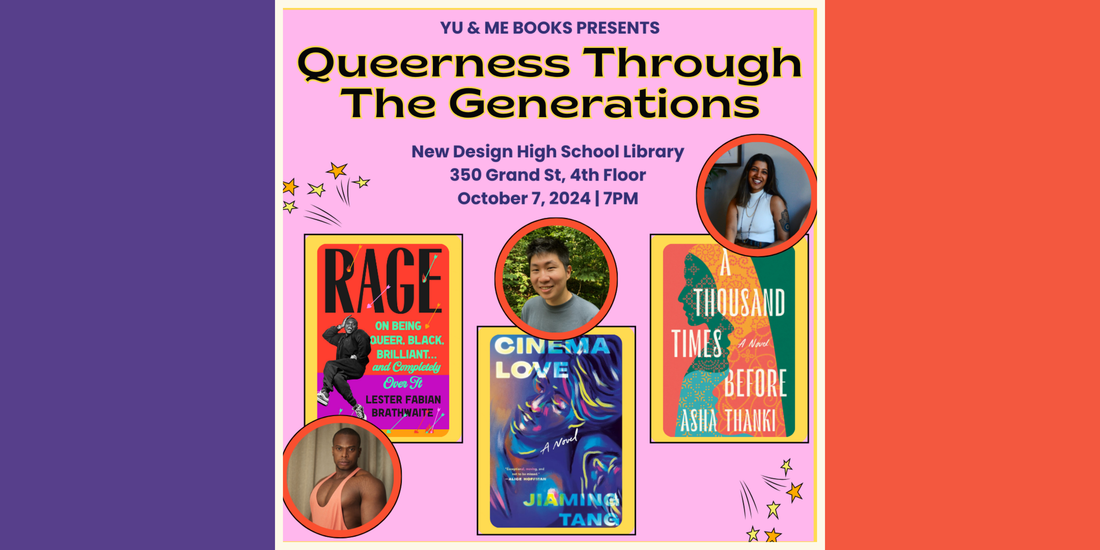
Author Panel | Queerness Through the Generations
Join authors Lester Fabian Brathwaite, Jiaming Tang, and Asha Thanki as they discuss queerness and writing in their generational novels.
Choose any of the featured titles at checkout for admission and a copy of that chosen book.
Please note that attendees who purchase their book ahead of time (in the ticketing options) will receive priority in the signing line after the book talk, and will have their books signed first!
Upon arrival, you will check in with a staff member and receive your number in the signing line.
Books will also be available for sale at the event itself, until sold out.
Please also consider making a donation with your RSVP! Donations go to Seward Park Campus Library (@SparkCampusLibrary), a proud NYC Public School high school library. Our library serves the five high schools in the building, and in partnership with New Design High School, we have been able to build a podcast/music recording studio to help students build 21st century skills. To that end, we are in the process of building MarkerSpark - a creative Makerspace focused on 3D engineering and design. Your donations are crucial to making this happen. Help us build out the vision of next year's leaders.
ABOUT RAGE by Lester Fabian Brathwaite
A debut book from Entertainment Weekly writer and former Out magazine editor Lester Fabian Brathwaite, Rage is a darkly comedic exploration of Blackness, queerness, and the American Dream, at a time when creative anger feels like the best response to inequality.
One romantic hopeful had greeted Lester Fabian Brathwaite on a dating app with this gem: “You into race play?” Being young, queer, gifted, and Black, Lester has found that his best tool for navigating American life was gallows humor. If you don’t laugh, you cry—or, you summon your inner rage. With biting wit, Lester’s book Rage interrogates all the ways that systemic racism and homophobia have shaped our society. All to pose that proverbial question: Can a gurl live?
ABOUT CINEMA LOVE by Jiaming Tang
Moving from rural post-socialist China to present-day NYC Chinatown, CINEMA LOVE is an immigrant story, a queer love story, and a tender examination of the legacies of caregiving and assimilation in Chinese America.
For over thirty years, Old Second and Bao Mei have cobbled together a meager existence in New York City’s Chinatown. But unlike other couples, these two share an unusual past. In rural Fuzhou, before they emigrated, they frequented The Workers’ Cinema: a theater where gay men cruised for love.
While classic war films played, Old Second and his fellow countrymen found intimacy in the privacy of the screening rooms. In the box office, Bao Mei sold movie tickets to closeted men—guarding their secrets, guiding them on their love lives, and even finding her own happiness with the projectionist. But when Old Second’s passion for his lover is discovered, a series of haunting events unfold that propel these characters toward an uncertain future in America.
ABOUT A THOUSAND TIMES BEFORE by Asha Thanki
A heartrending family saga following three generations of women connected by a fantastic tapestry through which they inherit the experiences of those that lived before them, sweeping readers from Partition-era India to modern day Brooklyn.
Ayukta is finally sitting down with her wife Nadya to respond to a question she’s long avoided: Should they have a child? The decision is complicated by a secret her family has kept for centuries, one that Ayukta will be the first to share with someone outside their bloodline: the women in her family inherit a mysterious tapestry, through which each generation can experience the memories of those who came before her.
Ayukta invites Nadya into this lineage, carrying her through its past. She relives her grandmother Amla’s life: Once a happy child in Karachi, Amla migrates to Gujarat during Partition, witnessing violence and loss that forever shape her approach to marriage and motherhood. Amla’s daughter, Arni, bears this weight in her own blood in 1974, when gender equity and urban class distinctions divide the community as a bold student movement takes hold. As Ayukta unspools these generations of women—whole decades of love, loss, heartbreak, and revival—she reveals the tapestry’s second gift: the ability for each of these women to dramatically reshape their own worlds. Like all power, both fantastic and societal, this inheritance is more treacherous than it seems.